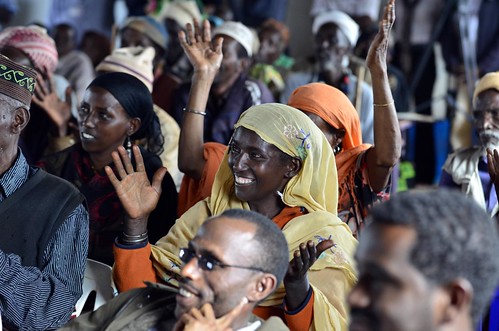Herders who took out livestock insurance under the Index-Based Livestock Insurance Project in a 2011 meeting in Marsabit, Kenya. A new markets book highlights the role of the insurance scheme in helping farmers protect their assets (photo credit: Neil Palmer/CIAT).
A new book on markets development for African smallholder farmers has highlighted a pioneering livestock insurance project as a key innovation that could enable African farmers reduce their losses in crop and livestock production.
The new publication: Towards priority actions for market development for African farmers, says lowering production and efficiency losses in agricultural production and improving agricultural markets will, among other actions, ‘level the playing field for smallholder farmers’ and support human and economic development in Africa. The books calls for the ‘right mix’ of policy and investments to not only ‘strengthen African policy expertise’ but also encourage ‘a more diverse array of investments and initiatives, including those initiated by the private sector.’
One such initiative that brings together private and public sector actors to support African agriculture is an Index-Based Livestock Insurance project in Kenya. The project is featured in a chapter in the new book.
Started in 2010 by the International Livestock Research Institute (ILRI) in partnership with UAP insurance, Equity Bank, Cornell University and the Index Insurance Innovation Initiative program at the University of California at Davis, the Index-Based Livestock Insurance project provides livestock insurance against forage losses to over 2500 households in Kenya’s Marsabit District. Freely available satellite imagery is used to assess conditions of pastures. When pasture vegetation is reduced to a level below a specified threshold, the insurance company pays herders who bought insurance. Yearly premiums cost USD100 for 6-8 animals.
Pastoral livestock sectors are at the heart of agricultural markets in Africa. Kenya’s livestock industry, for example, is estimated to be worth about USD800 million per year and produces most of the meat consumed in the country and is critical to the country’s food security. Research by ILRI shows that long-term solutions to food security in Kenya and other countries in the Horn of Africa need to support livestock herding. Pastoral systems are critical for the survival of livelihoods here and offer the most efficient way of managing the region’s large arid and semi-arid lands.
This insurance scheme is currently being piloted in other parts of Kenya and in Ethiopia. In late 2011, 600 livestock keepers insured through the project received insurance payments for vegetation losses arising from the drought that struck the Horn that year. The project is also now making use of mobile phones to widen its impact in remote communities.
Notes:
The new book, which is published by ILRI and the Alliance for a Green Revolution in Africa (AGRA), warns that ‘it will not be enough to simply produce more food from the fields and grazing lands of Africa.’ More effort is needed to create better markets and improve access to these markets’ especially in remote regions.
The book describes the outcomes of an international conference held in Nairobi three years ago that examined the ‘priority actions’ that if taken could speed up the development of African agricultural markets.
Authors of the markets books recommend enhancing markets for poor people, improving market information, lowering transaction costs associated with trading and adding value to farm produce by upgrading value chains and processing mechanisms.
Read more about the book
http://marketopportunities.blogspot.com/2012/03/agra-and-ilri-publish-proceedings-of.html
Download the full book or different sections:
https://cgspace.cgiar.org/handle/10568/16491
Read recent stories on the Index-Based Livestock Insurance Project from ILRI news:
View short films about the project

